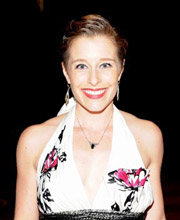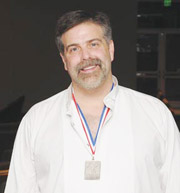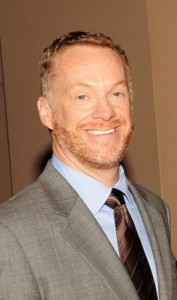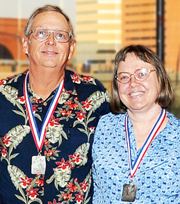Pride Marshals
Fiona Dawson, James Knapp, Mike and Linda Bratsen, and Legacy Community Health Organization
Fiona Dawson
James Knapp
Mike and Linda Bratsen (Honorary)
Legacy Community Health Services (Organization)

Fiona Dawson
2009 Pride Marshal
by Joyce Gabiola
“It is a huge honor. In true absolute honesty, I feel very humbled and shy, and I actually feel like I want to hide under a rock.” Fiona Dawson, known as one of the leading volunteers in our community, is reacting to having been voted as one of the grand marshals for Pride 2009.
Dawson wonders what her classified ad might read if one was to be published. She starts, “Overly committed,” and with careful thought, continues, “commitment phobe. . . .” Yes, readers, Ms. Dawson is single; so suit up, strut to the nearest Human Rights Campaign event and smile. However, it is her single status that she believes has a large part to do with her heavy community involvement.
Between her job at BBVA Compass in Corporate Responsibility and Reputation, commitments to the Human Rights Campaign on a national and local level, spending quality time with friends and volunteering for a myriad of other causes, when does Dawson find the time to nurture the world? “I think when you are determined to do something and you set a goal, it’s more a case of making the time to make it happen, rather than finding the time.”
Before landing in Houston in 2000, Dawson volunteered and worked in Bangladesh and Portugal. The spirit of volunteerism, of giving back to the community, was inspired by her mother, who passed away of pancreatic cancer in 2006. She remembers one of her earliest moments of charity. Along with her mother and siblings, she shoveled snow out of the path of the elderly people who lived behind her family’s house. “There were like 11 houses, and we knocked on their doors and asked if they needed milk or bread. We went down to the local shop to buy their milk and bread and walked back with it. Mum just encouraged us to do all of those things.”
At the mention of a Houston Voice article published in 2005 where she was quoted as saying she wanted to save the world, Dawson replies, “I want to apply myself to the best of my ability to make positive change in the world, and I think if you can try and live every day as though you’re seizing every opportunity there is to do something good, then maybe you’re, quote-unquote, saving the world.”
Her reason for remaining in Houston? “It’s hot and cheap,” she laughs. “Houston has been so good to me. The people here are incredibly embracing, and there are so many great causes to really apply yourself and get involved in. Houston is a great place of opportunity. I think people come and create themselves here.”
Dawson, who became a naturalized U.S. citizen in 2008, appears to have a lot of faith in the strength of our community to ultimately influence LGBT legislation on a national level. “I think that the more networking we do collectively as a GLBT community and the more people we get involved, we can create a stronger force here in Texas. I’m sure a lot of the nation looks at Texas and thinks there’s no way that we can push for GLBT legislation. But here in Houston, we’re very powerful and we can make a difference. We can make a difference on the local level—we’ve seen that—we can make a difference on the state level, and we can make a difference on the federal level.”
In addition to her faith in our community, she expresses faith in President Barack Obama and a “fair-minded house and senate.” However, fair-mindedness has come at a time when the nation’s crucial concern is the economy. “We’re at this juncture where we’ve put all this time and effort into getting the representation that we need, yet on the other hand, people are so scared about their daily lives and how they’re going to make the bills and whether they’re going to lose their jobs, that maybe they’re too scared to keep on investing and pushing. So what we’ve seen in the last eight years is more of a defense—defending ourselves and trying to make sure that nothing passes that takes our rights or limits us. Now we’re in a situation where we’re in offense and we can go for it, and we can see hate crimes legislation pass. And now with this wonderful movement of marriage equality across the states, we’re beginning to see great strides. Yet we’re not in a sound financial situation to fully back it up and kick it out in the field. . . . We’ve got to keep inspired and we’ve got to keep looking forward. Let’s not sit back and watch everything happen, because to do that would be dangerous, and we would lose this opportunity.”
Speaking of good causes, Dawson visited the Southern Poverty Law Center in Montgomery, Alabama, on business and learned of their program called Teaching Tolerance, which, according to their website, is dedicated to reducing prejudice, improving intergroup relations, and supporting equitable school experiences for children. “They empower the teachers with tools to talk about bullying at all levels, all dimensions of diversity,” Dawson says. The program created an event called Mix It Up at Lunch Day, in which more than 10,000 schools participate. It’s a call to action where students simply cross the lines of division by sitting with a group of students with whom they would not normally interact, therefore allowing the opportunity to make new friends and learn about and respect each other’s differences. “They did some diversity exercises and training,” she says, “and I was so thrilled to see that they included sexual orientation and touched on gender identity.”
Implementing tolerance education in schools is absolutely critical, according to Dawson. “As adults, whether we have children or not, it’s our responsibility to be role models for younger kids, so that they can learn that diversity is a part of life and it’s a value in life. I’m hoping to do some more work with them to see how we can increase the knowledge about that program and its presence and see if it’s something that can help teach tolerance in schools.
“I am so, so lucky to have family that loves me and accepts me for who I am. . . I was very close to my mum all the way up to her death. She’s very much a part of me always, every single day, every single moment. There’s never a time when I’m not with her or she’s with me.” Just as Dawson’s commitment to nurturing the well-being of the community, and thus the world, is lasting, so exists the giving spirit of her mother within.
Joyce Gabiola also writes about Legacy Community Health Services in this issue of OutSmart magazine.

James Knapp
2009 Pride Marshal
by Donalevan Maines
James Knapp had just finished unpacking at his new apartment in Boston when he got word that Houston’s LGBT community had selected him as the male grand marshal for this year’s Pride parade.
Fortunately, Knapp and his partner Jesse (“Jesse, James—we didn’t plan it that way,” he says) still have their house in Houston, where Knapp will continue as artistic and managing director of the Bayou City Performing Arts (BCPA) until around the time of Pride festivities. On Monday after the parade, Knapp will leave Texas, where he’s lived for 23 years, and return to his native New England.
His eyes well with tears as he says, “It’s going to be an important night for me, a big night, my last hurrah. I’m having a parade!”
Knapp’s legacy at BCPA will remain here: how the Gay Men’s Chorus of Houston blossomed under his leadership since 2001 to more than 100 singers; how its concert audiences grew from less than 300 at local churches to about 1,200 in its new residence the past three years at Jones Hall for the Performing Arts in downtown Houston; how Knapp launched the Bayou City Women’s Chorus in 2005, and nurtured it from a dozen singers at its first rehearsal to a choir of more than 50 singers, including lesbian, bisexual, and heterosexual women; how Knapp combined the voices of both men and women in the LGBT community and its supporters in founding the Bayou City Chorale, premiered at Jones Hall in 2007 with a benefit performance of “Sing for the Cure” for the Susan G. Komen Breast Cancer Foundation.
Knapp’s selection as male grand marshal is LGBT Houston’s way of tipping its hat to both the success of BCPA choruses and its longtime leader, whose childhood began as Jamie Knapp in a tough Irish-Catholic/Italian-Catholic neighborhood in Rochester, N.Y.
His family went to the American Baptist Church, which Knapp is quick to point out is more liberal, more progressive than Southern Baptists.
“Still, I was always instructed in a faith community, where the subtext was that you can’t be a Christian and be gay,” he says. “There was the feeling that I had to choose between family and faith and being gay.
“I always knew I was gay,” adds Knapp, who is now 50, “but I was too terrified to do anything about it. People didn’t even talk about sex. I didn’t know there was gay sex. I thought it was fooling around.”
Looking back, he recalls what a great role model he had in a proud gay man named Martin May, who was Knapp’s high school drama teacher. “Mr. May was not married, so you can imagine the play on words, ‘You have a class with Mr. Gay.’ But he always stood tall. He wore big pump heels like in Saturday Night Fever , he did great work, and his classroom was a haven for all the outcasts and misfits.
“My real eye-opener was going to college” (at Fredonia State University), he explains. “That’s the first time I was confronted with a lot of gay people, being overtly gay, talking about gay sex, and having same-sex relationships.
“It kinda freaks you out,” he remembers. “What freaks you out about it, is that’s who you are. And away from home, you have the time, place, and opportunity to embrace your personhood.
“Then the pivotal moment for me was going to Europe,” he says, to study at the Conservatory of Music in Salzburg, Austria. “When I got off the plane, not knowing one person on that continent, I changed my name to James, and I said, ‘I’m going to do things differently,’” meaning that he was now officially out.
“They just didn’t care over there!” he laughs. “They were light years ahead of the United States.”
Two years later, a professor encouraged him to pursue his master’s degree at the University of Texas at Austin. “Moving from Austria to Texas was like moving from Earth to Mars,” he says. “You would think it would cause me to go running back into the closet. But I found Austin to be an oasis of enlightenment, and after living with integrity, I said ‘I’m not going back.’”
From Austin, Knapp moved to Chicago for five years, then returned to Texas and spent eight years as minister of music at First United Methodist Church in Sugar Land, a former company town built around the Imperial Sugar plant.
“It was wild. It was just a bunch of pastures,” he explains. “The congregation where I worked was 100 years old, and I saw the whole [U.S. 59] corridor go from fields” to its current status as one of the fastest-growing cities in the nation.
Knapp settled into a home in Northfield Subdivision near Braeswood and Fondren for “practical purposes,” he says. “It was 15 minutes from work and 20 minutes to downtown.”
Living outside of the Montrose gayborhood, he says, “We are pioneers. I think that has a big impact on people. It’s a really good experience for [heterosexuals].”
In particular, he says that his next-door neighbors, who are orthodox Jews, “didn’t know what to think at first, but now we have dinner together, we have keys to each others’ houses, we’ve been a positive influence.”
Likewise, he says, there are a number of fellow “pioneers” in BCPA choirs, LGBT singers who live outside the Houston city limits, in areas that include Pearland, Katy, and the Woodlands.
“Two guys come from Bellville, and because of their courage in living openly as they do out in the country, we have about 15 Bellville groupies,” Knapp laughs. “They come to every performance and always join us afterwards when we go out to dinner.”
With BCPA members dressed as mermaids and “mer-men” in the Pride parade, chances are that Bellville groupies of the Gay Men’s Chorus of Houston will be diving for pearls as the float passes by them.
Knapp says he hopes the male grand marshal convertible he’s riding in will be positioned near BCPA’s float. Meanwhile, he admits, “I’m absolutely obsessing with what I’m going to wear.”
Donalevan Maines also writes about theater critic Everett Evans and the Tony Awards in this issue of OutSmart magazine.
From PFLAG Heroes to Pride Parade Marshals:
Mike and Linda Bratsen
2009 Pride Honorary Grand Marshals
by Marene Gustin
Santa Fe, in Galveston County, isn’t historically the kinda place you’d want to be out and loud.
The rural town of under 10,000 has a pretty conservative history. From the days when it was known as a sundown town (as in “people of color need to leave town before sundown”) to the ’80s shrimpers protest against the influx of Vietnamese that spawned the film Alamo Bay to the Supreme Court case based on prayer in school, Santa Fe is about as white-bread, redneck as it gets in Texas.
Add to living there parents who own a well–digging company, and it’s no wonder Steven Bratsen had a hard time coming out to his parents. Finally, someone else did it for him.
“One of our employees got tired of hearing Steven say he couldn’t tell us, so he took me aside one day and told me my son was gay,” remembers Linda Bratsen of that day in 2001. “I had absolutely no idea.I was shocked.”
She and her husband Mike were also in unknown territory. They didn’t know any gays, barely knew what gays were. At first they took their teenage son to a Methodist preacher for counseling. Linda says Steven was miserable, and she was pretty “torn up” over it all, too.
“I was worried about him,” she says, “that some nut was going to hurt him, while he was driving around Santa Fe with a rainbow flag on his truck. And I was worried that he wouldn’t be happy, never get married or have a family. And I felt guilty that he felt he couldn’t talk to us for so long. I just felt isolated.”
Then, the Bratsens found PFLAG.
“It was like a light going on,” Linda says.
Sue and Jim Null had asked Steven to bring his folks, and they remember Linda crying through that first meeting. But after that, Mike and Linda became standard-bearers for the cause. Linda marched with Steven in the Pride parade, became PFLAG’s librarian (a volunteer post she’s held for seven years) and served on the board. As a family the Bratsens helped establish the first Gay–Straight Alliance in Santa Fe High School, represented PFLAG at the Texas Counselors Association convention, volunteered for Bunnies on the Bayou, and made some award-winning PFLAG Pride floats.
“Mike knows construction, so one year they asked if he could build the frame,” Linda says. “And he said he’d try. It came out so good he does it every year, and then we all help decorate it.”
And the woman who remembers getting goose bumps the first time she saw a march is about to get the thrill of her life. Linda and Jim are going to be this year’s honorary pride marshals.
“It’s a fantastic honor!” says Linda. “This is an experience Mike and I will never forget!”
And as for Steven, the 27-year-old hotel project manager was ecstatic, says his proud mom.
“Although what Mike and I do isn’t just about Steven anymore, it’s about the community and making the world a better place. We just want to do as much as we can.”
Marene Gustin is a freelance writer and a frequent contributor to OutSmart magazine.

Legacy Community Health Services
2009 Pride Grand Marshal (Organization)
by Joyce Gabiola
Legacy Community Health Services—we practice medicine, but we’ve perfected care. Perfection takes time, and with the agency having started in the late 1970s, time has certainly passed. The men and women who have worked nonstop to bring comprehensive health services to our community over the past three decades have left an important legacy, not just in the LGBT community, but in the city as a whole.
Eric Roland, senior director of marketing for Legacy, has himself been a patient since 1996. Roland was diagnosed HIV positive at one of Legacy’s locations in 1995, and in 1998, he came to work at Legacy. “I’m one of those people from the hair club—I’m not only a spokesman, I’m also a graduate.” Roland is currently a patient of Legacy physician Dr. James Carroll. “It’s cool that I not only work here, but I’m also a patient here. I can see it from both sides. It’s great care here.”
And it is this great care and their impact on the community that has led to Legacy being named the organization grand marshal for Pride 2009. “Being nominated as the grand marshal for the Gay Pride Parade for the first time ever is incredible. It’s a great honor for us to have that and to be represented in the Pride parade.”
Legacy is a federally qualified health center (FQHC) that is recognized nationwide for its comprehensive program for the treatment of people with HIV. Although the agency started as a STD clinic, today it offers healthcare for men, women, and children, including family planning, eye-care services, psychiatry, dermatology, health promotion and community outreach, wellness services—physical therapy, personal training, and nutrition—as well as specialty healthcare for HIV/AIDS. They provide a compassionate, culturally sensitive and judgment-free environment for a diverse clientele.
Legacy’s progression has been dramatic and impressive. It was incorporated in 1981 as the Montrose Clinic, founded by two gay doctors who, in the late ’70s, saw their gay brothers walking around with gonorrhea, syphilis, or chlamydia, because they didn’t want to go to their doctor. For fear of judgment, the alternative was to go untreated. According to Roland, the two doctors started operating a clinic out of their office one night a week, and the legacy grew from there.
HIV hit Houston in about 1982. So according to Roland, it was a natural progression to go from a STD clinic to one treating HIV. “At the time it wasn’t called HIV; it was AIDS. Most of the people would come in sick and die.” There was no test for it, but the agency created educational programs. One of their first programs was aimed at helping parents, families, and friends deal with someone in their family who had AIDS. Shortly after, the Next Step program was created for people who were newly diagnosed with HIV, who were scared, didn’t know what to do, and didn’t know what was going to happen. Roland reveals that the program curriculum offered information on how to plan for your funeral, how to budget yourself, and what was going to happen in the hospital. Eventually these issues were no longer part of the program, because most people with HIV were catching it early enough, and Legacy was active in educating them about the disease to keep them healthy.
Roland explains, “Through the years we’ve expanded, always in response to a need.” In the late 1980s a lot of people with HIV/AIDS were getting Cytomegalovirus (CMV) retinitis. It is a virus that is related to the herpes family and causes blindness. Eye doctors didn’t understand AIDS or CMV retinitis, or were afraid of people with AIDS, so the agency created their own eye clinic, specifically with the task of conducting CMV screenings. They worked with the University of Houston’s eye clinic and school to bring in optometry students to perform the screenings.
It was a natural thing for them to start a primary healthcare clinic for people with HIV, says Roland, which happened shortly after they moved into the building at 215 Westheimer in 1994. They keep expanding their programs as they continue to identify needs in the community. They began to offer psychiatric services for HIV-positive clients when they recognized that need; they merged with Body Positive when they saw the need for fitness. “We’ve created a model of care for someone who is HIV positive and doesn’t have health insurance,” Roland says. “They come in and they can see a doctor. They can get nutrition, wellness, eye care, psychiatry, dermatology. It is a model that has been talked about around the country as one of the best ways to treat people with HIV.”
Legacy continued to listen to the community. In response to the medical needs of the uninsured, the organization researched other agencies around the country, such as Howard Brown Health Center in Chicago and Fenway Community Health Center in Boston. They found that these clinics were becoming federally qualified health centers, which allowed them to provide primary healthcare services not only to HIV patients, but to everyone. In 2004 Legacy started applying to become a FQHC with support from Fenway Clinic, who helped them tremendously during the application process.
In 2005, Walgreens was implemented in Legacy’s Westheimer location. Also, while becoming a FQHC, the Montrose Clinic merged with The Assistance Fund to help with overhead costs and to help diversify. “It made sense to bring the two organizations together,” states Roland. The boards of The Assistance Fund and Montrose Clinic convened and decided that the new name was going to be “Legacy.” “We wanted to honor all those people who built this place and left their legacy to us.”
In 2006 Legacy opened a satellite clinic in Houston’s Fifth Ward, which was offered to them by the city of Houston. “Oftentimes, I get, ‘You’re not serving the gay community anymore’ or ‘You’ve abandoned the gay community.’ Considering when we were Montrose Clinic, really the only people who got services were gay men who had HIV. Now we can see people who absolutely have no ability to pay. That’s anyone in the community. So actually, we offer more services than we did before.”
Personally, Roland is proud that a clinic, which was started in the gay community, can now go out and serve other communities who have healthcare needs. According to Roland, other organizations have approached Legacy to open a clinic in their organization. “It’s incredibly meaningful for other organizations that have been around forever—one of them is a hospital system.
“I am so excited for the future, what this agency is going to do,” he says. Legacy is determined to provide dental services within the next couple of years, providing small-scale services at first, which will grow over time. In addition, Legacy hopes to take the same comprehensive model that they created and developed for HIV care and apply it to other diseases, such as diabetes and heart disease.
“We’ve gone through a lot of growth, but we’re still there for the community,” assures Roland.
Joyce Gabiola also writes about Fiona Dawson in this issue of OutSmart magazine.












Comments